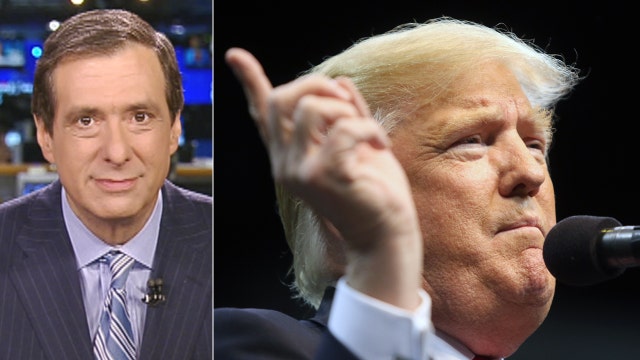Kurtz: Trump wins at psychology
'MediaBuzz' host discusses Trump's momentum after primary wins
Presidential campaigns are about media, math and momentum. But in the wake of Donald Trump’s five-state sweep in the Northeast yesterday, it’s time to add another measure.
And that is psychology.
Which may be his biggest advantage.
By adding Pennsylvania, Maryland, Delaware, Connecticut and Rhode Island to his New York landslide, Trump is clearly riding a wave of momentum and positive media coverage.
But when you get to math, the journalistic nitpickers come up with various scenarios in which Trump may not get to 1,237, leaving him vulnerable to a contested convention. Fair enough. (Yes, any other front-runner would have been declared the de facto nominee, but The Donald is a rather controversial fellow.)
Which brings us to the psychology surrounding a candidate who has won state after state in all regions of the country—from Alabama to Massachusetts, from Georgia to New Hampshire, from Florida to Nevada, from South Carolina to Illinois. And look at the margins: 46 percent in Arizona, 46 percent in Florida, 47 percent in Mississippi, 60 percent in New York.
Ted Cruz won Wisconsin by an impressive 48 percent, but outside of his 44 percent victory in Texas, and nearly matching Trump with 41 percent in Missouri, most of his wins have come in caucus states where he has outperformed his rival at the inside game.
Cruz pivoted to a different target last night, saying the media were having "palpitations" over Trump's expected big night and that he is the fourth estate's "chosen" candidate. That's become a standard Cruz riff, even as Trump gets more than his share of bad press and biting commentary and himself complains about the "dishonest" media.
What's true is that as Trump continues to pile up primary wins, the psychology shifts, and most of the media and political establishments now expect him to be the nominee—whether they regard that prospect with excitement or loathing. Six in 10 Republicans say in a recent poll that the candidate with the most votes should be the party’s standard-bearer, magic number or not. Two-thirds of Connecticut Republicans said the same in an exit poll yesterday.
That leaves Cruz, who has way exceeded expectations in this campaign, in the position of arguing that he should be the alternative to Trump, even as he loses state after state. (Yes, Cruz could win Indiana next week, but that doesn’t change the overall equation.)
And it leaves John Kasich, who has won exactly one state—his own—arguing that a fractured convention should turn to him.
The Cruz-Kasich non-aggression pact quickly fizzled, and not just because the two rivals said they still wanted votes in the three states where they are not campaigning in deference to the other guy. It was because their supporters don’t have much in common, and they handed Trump the argument that his opponents are playing insider games to deprive him of the prize.
Psychology isn’t everything. Trump could hit a rough patch as he toggles between appearing more presidential and mocking Kasich’s eating habits. He could underperform in California and New Jersey on June 7.
But the mindset of Trump’s supporters will be anger and disgust if they feel he’s been cheated out of the nomination. And that may matter as much as any numbers.





















